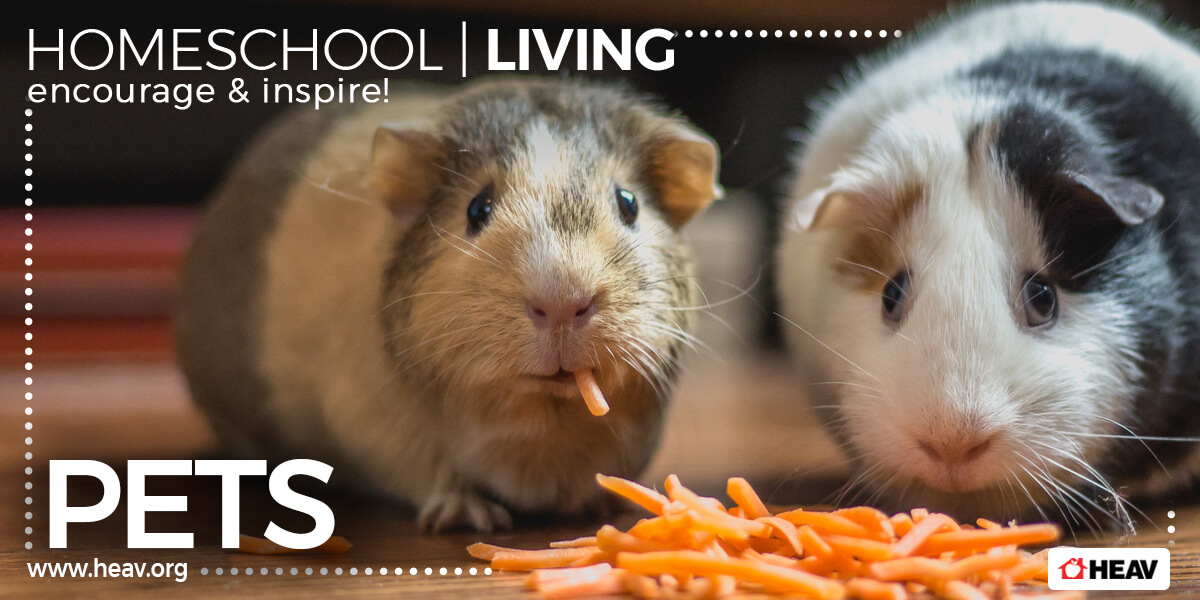The Best Pets for Kids: Lessons for Homeschool
If you’re considering adding a pet to your family, or simply want to get the most beneficial experience from a pet you already have, check out this Homeschool Living for information about the best pets for kids, ways to incorporate pets into your homeschool, pet unit study ideas, best pet practices and safety tips, and more!
In addition to teaching responsibility as your child takes on the role of caregiver to the pet, pets have been shown to have a positive effect on mental health. They can help children develop social skills by providing a common topic of interest, by lending an ear to students who struggle to read aloud, practice speeches, or presentations, and by simply offering an opportunity for them to talk about their day. Pets can also encourage children to think for themselves and spark an interest in a variety of subject areas. Questions like “Can fish hear?,” “How much does the dog weigh?,” “How long can a snake grow?,” and “Do parakeets live in the wild?” can be used to jumpstart lessons in science, math, geography, and more.
In this blog post from The Happy Housewife, a homeschool mom shares pros, cons, and stories about the small pets her home has housed. Some of her tips may help you decide on the best pet to add to your family. Go to https://thehappyhousewife.com/homeschool/homeschooling-and-pets to read more about this.
Lessons from Pets
Incorporating your dog into your homeschool can provide some excellent learning opportunities and responsibilities, which can be assigned to students at varying degrees based on their ages and abilities. Even the youngest children can have the “job” of learning how to respect, love, and care for the dog without hurting it. This blog post from My Joy-Filled Life offers some great ideas for lesson plans related to dogs, general responsibilities to consider, and some benefits of the companionship offered by your pet.
There are many ways an interest in a pet can be used to illustrate learning opportunities in almost any subject. Check out these pet unit study ideas from The Homeschool Mom, with topics such as pet care, business and economics, animal behavior, training, civic considerations and social responsibility, current events, and much more. Go to www.thehomeschoolmom.com/pet-unit-study-ideas/
Safety Tips for Pet Lessons
Pets can be a fun and exciting addition to the family, but knowing how to handle pets safely is a vital part of learning best pet practices. The popularity of dogs as pets means that it’s practically a given that your child will interact with at least one in some capacity. These dog safety tips will help you teach your child how to respect an animal’s space, evaluate its behavior, and approach (or not!) and interact with it safely–whether it’s a strange dog or your own.
What do you do when you or your child has a pet allergy, but you would still like to add a furry friend to you family? There are ways to help manage allergic reactions to pets, whether by welcoming a smaller pet that can be contained for easier management, or exploring feathered or scaled friends as an alternative. This post from Molekule examines the common causes of pet allergies, ways to help reduce and manage the risks, and alternatives to traditional pets that may be a better option for families with allergies.
Pet Volunteer Opportunities for Teens
With all the benefits of having a pet in your own home, there are still plenty of situations that might not lend themselves to pet ownership–allergies or illness, living situations, financial restrictions, and time commitments are all good reasons to explore the benefits of animals outside your home. An older student who might want a pet, but is unable to keep one, might be able to volunteer at an animal shelter. This article from Petful offers advice on how to get started as a volunteer, what to expect, and more. Be sure to check the age restrictions and time requirements for your local shelter; some shelters allow volunteers as young as twelve, some require minors to be accompanied by a volunteering adult, and some require a specific hour or time commitment.
Pet ownership and care will provide lessons that no other experience will; and while not everyone will be a self-proclaimed “animal person,” everyone can and should learn to take care of something other than themself. Learning to empathize with and care for something–that may even be annoying them at the moment–is an invaluable lesson that children will need to draw from for the rest of their lives, and the best pet for your homeschool is the one that will help you model and teach just that!









